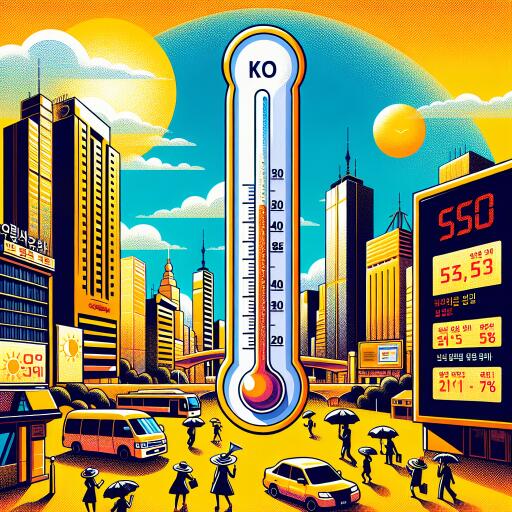
South Korea Witnesses Historic Highs in Summer Temperatures Amidst Growing Climate Concerns
During the most recent summer months of June through August, South Korea has seen unprecedented heat waves, marking the country’s highest-ever recorded average temperatures since official records commenced over fifty years ago. The Korea Meteorological Administration (KMA) reported that the average temperature soared to 25.6 degrees Celsius (78.08 Fahrenheit), an alarming increase of 1.9 degrees from the long-standing historical summer averages.
This year’s meteorological data indicates a significant departure from past weather patterns, with the KMA highlighting that temperatures remained unusually high throughout the period, even during the monsoon seasons that typically bring cooler weather. Jang Dong-un, the Chief of the KMA, pointed towards climate change as the primary driver behind these shifting patterns. “The shift in weather conditions, including the heavy rainfall during the monsoon and the subsequent prolonged heatwaves, have brought about considerable discomfort and adverse effects on the populace,” Jang noted. He underscored the agency’s commitment to enhancing its monitoring and analysis of erratic weather phenomena in light of these changes.
The global stage too mirrors this worrying trend, with 2024 being flagged as the year with the highest global average temperature, as observed by the European Copernicus Climate Change Service. The International Institute for Environment and Development has also raised concerns, noting a 52 percent increase over the past three decades in the occurrence of days where the temperature escalates to 35C (95F) in major capital cities worldwide. This aligns with the increasing frequency of heatwaves, a natural consequence of ongoing global warming and climate change according to scientists.
Compounding the heat concern in South Korea is the record-breaking persistence of ‘tropical nights’ – nights where temperatures fail to dip below 25C. This phenomenon stretched over an average of 20.2 days this summer, a stark increase from the previous mean of 6.5 days. Specifically, Seoul experienced 39 consecutive tropical nights, shattering the prior record of 26 days, evidencing the drastic shifts in night-time temperatures fueled by sustained hot and humid southwesterly air currents.
In a landmark move last week, South Korea’s Constitutional Court ruled that the nation’s current climate objectives fall short of constitutional mandates, delivering a significant victory to environmental activists. The ruling stems from a lawsuit alleging that the current pace of addressing climate issues jeopardizes the living conditions of future generations. They argue this failure to act not only degrades the environment but also burdens future populations with the monumental task of reducing greenhouse gas emissions. Such a scenario, the activists maintain, breaches the state’s responsibility to safeguard the fundamental rights of its citizens.
As the planet grapples with what has been termed an “extreme heat epidemic” by UN Secretary-General Antonio Guterres, nations and their governments are called upon to enact more stringent measures to mitigate the impacts of climate-induced heatwaves. South Korea’s recent experiences and judicial responses underscore the urgent need for comprehensive action in the face of escalating global warming challenges.





Leave a Reply